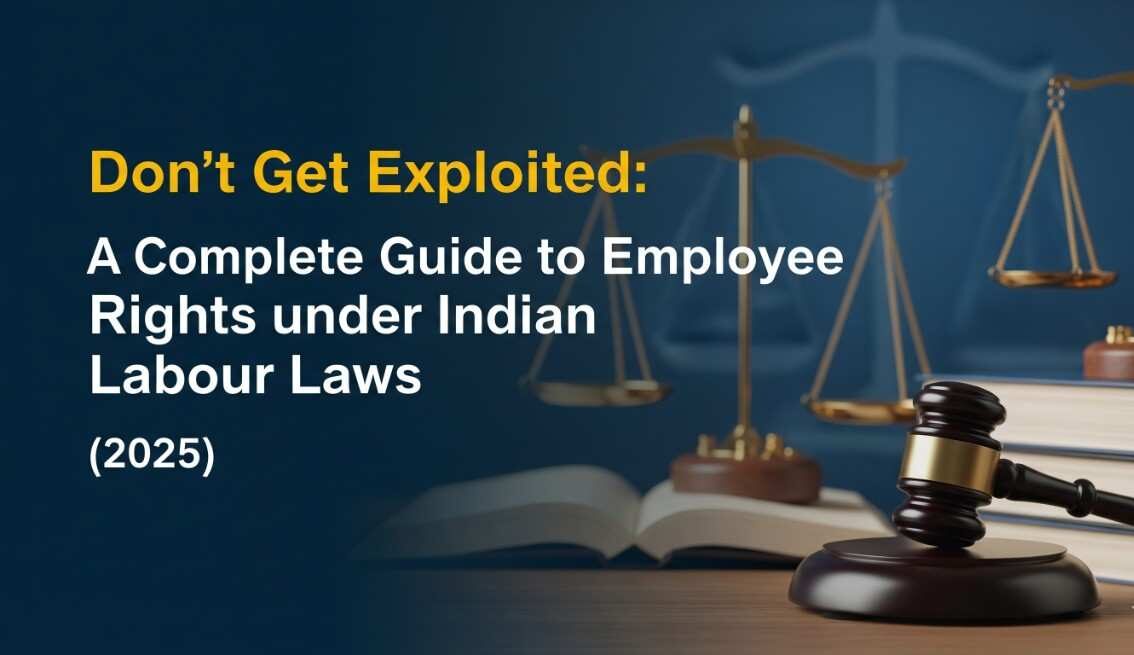Employee rights in India under labour laws explained. Learn about wages, working hours, leave, job security, EPF, and termination rules in 2025.
Introduction
Employee rights in India are protected through various labour laws that safeguard fair wages, working hours, social security, and job security. These laws are essential to prevent workplace exploitation and ensure dignity for workers in every sector.
Labour laws in India play a crucial role in safeguarding employees from exploitation and ensuring a fair working environment. These laws are designed to regulate wages, working hours, health and safety standards, social security, and termination procedures. Whether you are a fresh graduate entering the workforce or an experienced professional, being aware of your rights under Indian labour laws is essential to protect yourself and demand fair treatment at work.
Minimum Wages Act, 1948
The Minimum Wages Act, 1948, ensures that every worker receives fair pay according to their skill level, type of work, and location. The central and state governments revise minimum wages periodically to reflect inflation and the cost of living.
Key Points:
- Different wages are prescribed for skilled, semi-skilled, and unskilled workers.
- Minimum wages vary across states and industries.
- Employers cannot pay less than the fixed minimum wage, regardless of agreement.
This Act prevents exploitation by guaranteeing that even the lowest-paid workers earn a basic standard of living.
Factories Act, 1948
The Factories Act, 1948, focuses on the health, safety, and welfare of workers employed in factories. It ensures that employees work in safe environments and have access to necessary facilities.
Key Provisions:
- Maximum working hours: 48 hours per week, 9 hours per day.
- Compulsory weekly holidays.
- Adequate lighting, ventilation, and cleanliness in the workplace.
- Safety measures for handling machinery and hazardous materials.
- Canteen, washrooms, and restrooms for employees in larger factories.
This Act emphasises the importance of a safe and humane work environment.
Employees’ Provident Fund (EPF)
The Employees’ Provident Fund (EPF) scheme is one of the most important social security benefits available to salaried employees in India. Governed by the Employees’ Provident Fund and Miscellaneous Provisions Act, 1952, it ensures financial stability post-retirement.
Key Benefits:
- Both employer and employee contribute 12% of basic salary + DA to EPF.
- Provides retirement savings, pension, and insurance.
- Employees can withdraw EPF funds under certain conditions (education, medical emergencies, or unemployment).
- Interest earned on EPF contributions is tax-free.
This scheme helps employees build a financial cushion for the future.
Payment of Wages Act, 1936
The Payment of Wages Act, 1936, ensures the timely and complete payment of salaries without unlawful deductions. It applies to employees earning below a certain wage threshold (periodically revised by the government).
Highlights:
- Employers must pay wages on time (before the 7th or 10th of each month).
- Deductions are allowed only for provident fund, income tax, or specific penalties approved by law.
- No arbitrary cuts in salaries are permitted.
This law protects employees from delayed or unjustified salary deductions.
Working Hours & Leave
Indian labour laws regulate working hours and leave entitlements to ensure a healthy work-life balance.
General Provisions:
- Working hours: Maximum 48 hours per week, 9 hours per day.
- Weekly rest: At least one day off per week (usually Sunday).
- Paid leave: Employees are entitled to casual leave, sick leave, and earned leave (depending on company policy and state laws).
- Maternity leave: Under the Maternity Benefit Act, women are entitled to up to 26 weeks of paid leave.
These provisions ensure that employees are not overworked and have adequate rest.
Termination & Job Security
Labour laws also protect against wrongful termination. Employees cannot be arbitrarily dismissed without following due process.
Key Protections:
- Employers must provide a valid reason and notice period before termination.
- Retrenchment or layoffs must comply with the Industrial Disputes Act, 1947.
- Employees may be entitled to compensation in cases of wrongful termination.
- Workers can approach the labour courts if they face unfair dismissal.
These protections ensure that employees have legal recourse in case of unfair treatment.
Conclusion
Indian labour laws are designed to create a balance between the rights of employees and the responsibilities of employers. From ensuring fair wages and safe working conditions to securing retirement benefits and protection against wrongful termination, these laws safeguard the dignity and security of workers.
Every employee should stay informed about their rights, as awareness is the first step towards preventing exploitation. A well-informed workforce not only strengthens employee confidence but also builds healthier and more productive workplaces.
Frequently Asked Questions (FAQ) on Employee Rights under Indian Labour Laws
1. What are the basic employee rights in India?
Employees in India have rights, including fair wages, safe working conditions, weekly holidays, paid leave, social security (EPF, ESI), and protection against wrongful termination.
2. What is the maximum working hour limit in India?
According to the Factories Act, 1948, employees are limited to working a maximum of 48 hours per week and no more than 9 hours per day.
3. Is maternity leave paid in India?
Yes. Under the Maternity Benefit Act, 1961, women employees are entitled to 26 weeks of paid maternity leave (for up to two surviving children) and 12 weeks for more than two children.
4. Can an employer terminate an employee without notice in India?
No, termination without notice is considered wrongful unless it is for gross misconduct or specified in the employment contract. In most cases, a notice period or compensation must be provided.
5. What is the minimum wage for employees in India?
The minimum wage in India varies by state, skill level, and type of work. For example, unskilled workers in Delhi have a different minimum wage compared to skilled workers in Maharashtra. The government revises these rates periodically.

























